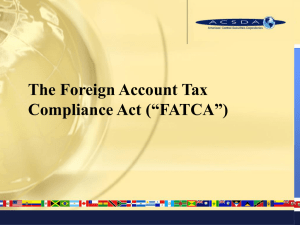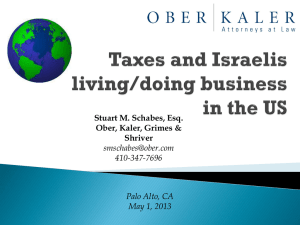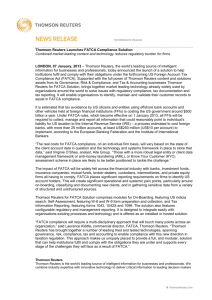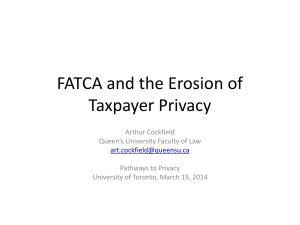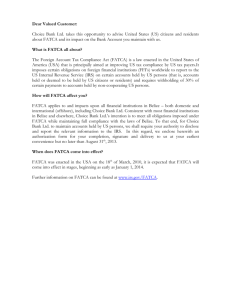FATCA Frequently Asked Questions (FAQs)
advertisement
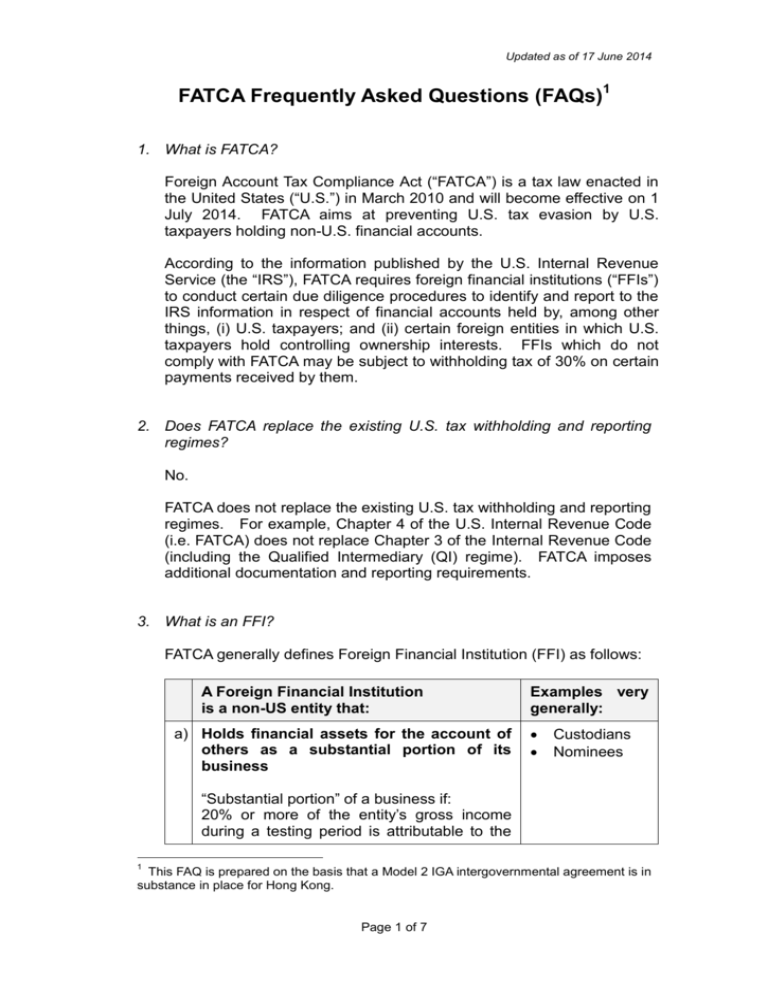
Updated as of 17 June 2014 FATCA Frequently Asked Questions (FAQs)1 1. What is FATCA? Foreign Account Tax Compliance Act (“FATCA”) is a tax law enacted in the United States (“U.S.”) in March 2010 and will become effective on 1 July 2014. FATCA aims at preventing U.S. tax evasion by U.S. taxpayers holding non-U.S. financial accounts. According to the information published by the U.S. Internal Revenue Service (the “IRS”), FATCA requires foreign financial institutions (“FFIs”) to conduct certain due diligence procedures to identify and report to the IRS information in respect of financial accounts held by, among other things, (i) U.S. taxpayers; and (ii) certain foreign entities in which U.S. taxpayers hold controlling ownership interests. FFIs which do not comply with FATCA may be subject to withholding tax of 30% on certain payments received by them. 2. Does FATCA replace the existing U.S. tax withholding and reporting regimes? No. FATCA does not replace the existing U.S. tax withholding and reporting regimes. For example, Chapter 4 of the U.S. Internal Revenue Code (i.e. FATCA) does not replace Chapter 3 of the Internal Revenue Code (including the Qualified Intermediary (QI) regime). FATCA imposes additional documentation and reporting requirements. 3. What is an FFI? FATCA generally defines Foreign Financial Institution (FFI) as follows: A Foreign Financial Institution is a non-US entity that: a) Holds financial assets for the account of others as a substantial portion of its business Examples very generally: Custodians Nominees “Substantial portion” of a business if: 20% or more of the entity’s gross income during a testing period is attributable to the 1 This FAQ is prepared on the basis that a Model 2 IGA intergovernmental agreement is in substance in place for Hong Kong. Page 1 of 7 Updated as of 17 June 2014 A Foreign Financial Institution is a non-US entity that: Examples very generally: holding of financial assets and related financial services b) Accepts deposits in the ordinary course of a banking or similar business Banks c) Conducts as a business (or is managed by an entity that conducts as a business) the following activities for or on behalf of a customer: trading in securities; individual and collective portfolio management; or investing, administering or managing funds or money on behalf of other persons Entities that conduct as a business for customers, trading in securities ETFs Hedge Funds and Private Equity Funds Certain Investment Fund Managers d) Is an insurance company (or its holding company) that issues or is obligated to make payments with respect to a cash value insurance policy or an annuity contract Life Insurance companies The above is general background information only. Each legal entity should evaluate for itself whether it is an FFI under FATCA. 4. What is an NFFE? An NFFE is a Non-Financial Foreign Entity. NFFE is defined as any foreign entity that does not meet the definition of an FFI, and very generally includes, among other things: non-financial entities meeting specified rules, professional services firms, and charitable organizations meeting specified rules. 5. What is an Intergovernmental Agreement (IGA)? Has Hong Kong signed any IGA with the U.S. Government? IGAs are developed by the U.S. Government to facilitate the compliance and implementation of FATCA to remove the potential conflict-of-law issues in other jurisdictions. There are two distinct frameworks of IGAs, referred to as “Model 1” and “Model 2” frameworks. Page 2 of 7 Updated as of 17 June 2014 The Hong Kong Government reached a Model 2 IGA in substance with the U.S. on 9 May 2014. As such, financial institutions should register with the IRS by 1 July 2014 to obtain a Global Intermediary Identification Number (GIIN) and be subject to the terms of an FFI Agreement. 6. How does an FFI comply with FATCA under a Model 2 IGA? An FFI needs to register with the IRS and be subject to the terms of an FFI Agreement. The obligations include, among other things, (i) registration with the IRS; (ii) conducting certain due diligence procedures; (iii) reporting to the IRS annually certain information concerning financial accounts held by U.S. taxpayers or foreign entities in which certain U.S. taxpayers hold controlling ownership interests; (iv) reporting to the IRS information about the number and aggregate balance of non-compliant FFIs and of “Non-Consenting U.S. Accounts”; (v) obtain the consent of relevant parties for reporting their information to the IRS; and (vi) withholding of certain amounts paid to non-compliant FFIs. 7. What are the main types of FATCA-compliant FFI classifications? An FFI that is FATCA-compliant in a Model 2 IGA jurisdiction will generally be a Reporting Financial Institution (FI) complying with due diligence requirements as described in Annex I of the IGA, or a Non-Reporting FI (including certain FFIs described in Annex II of the IGA and certain other deemed-compliant or exempted FFIs). If the FFI is in a jurisdiction that has not entered into an IGA, the FFI will have to enter into an FFI Agreement with the IRS and comply with the U.S. FATCA Treasury Regulations. Such an FFI would be treated as a Participating FFI (PFFI). 8. What are the consequences to an FFI of not complying with FATCA? Non-compliance potentially carries a penalty of a 30% withholding tax applied to withholdable payments received by the FFI. This penalty applies to not only the FFI’s own assets but also assets held for customers. Withholdable payments generally include, among other things: a) U.S. dividend income and U.S. interest income paid after 30 June 2014; and b) Gross proceeds from any sales occurring after 31 December 2016 Page 3 of 7 Updated as of 17 June 2014 of any property, such as U.S. stocks, U.S. Treasuries and other U.S. debt securities, that can produce U.S. dividends or U.S. interest income. Also, under a Hong Kong IGA, Hong Kong financial institutions will be directed to comply with FATCA. 9. Who can be the Responsible Officer (“RO”) and what are the responsibilities of RO? RO of an FFI is responsible for the FATCA compliance program of the FFI and certifying on FATCA compliance to the IRS. The person to be appointed as RO should have sufficient authority to fulfill the duties of a RO, who may or may not be the responsible officer of the Licensed Corporation regulated by the Securities and Futures Commission. Major duties of a RO include: certification of FATCA compliance of the FFI to the IRS, including the completion of FATCA due diligence on existing clients; implementation of FATCA compliance program; and notification to the IRS of significant non-compliance with FATCA requirements. 10. What is the timeline for FATCA compliance? Registration Now IRS FATCA Portal available for registration 5 May 2014 Last day to register for inclusion on the 2 June 2014 IRS list of FFIs that have registered 3 June 2014 Last day to register for inclusion on the 1 July 2014 IRS list of FFIs that have registered 30 June 2014 Last day for FFIs to register with the IRS to be FATCA compliant by 1 July 2014 Due Diligence 1 July 2014 New account due diligence procedures must be in place to establish the FATCA status of new individual accounts 31 December Need to complete due diligence on preexisting “prima 2014 facie FFI” accounts (including any “prima facie FFI” onboarded during the 1 July 2014 – 31 December 2014 period); and New account due diligence procedures must be in place to establish the FATCA status of new entity accounts 30 June 2015 Need to complete due diligence on preexisting high value accounts held by individuals Page 4 of 7 Updated as of 17 June 2014 30 June 2016 Need to complete due diligence on all other preexisting accounts (including on entity accounts onboarded during the 1 July 2014 – 31 December 2014 period that are not “prima facie FFIs”) Reporting 15 March 2015 31 March 2015 Begin FATCA reporting of certain “withholdable payments” made for calendar year 2014 Begin FATCA reporting for calendar year 2014 for (i) U.S. accounts; (ii) Passive NFFEs with Controlling U.S. Persons; and (iii) Non-Consenting U.S. Accounts 31 March Reporting of certain Nonparticipating FFIs to which 2016 certain payments were made for calendar year 2015 29 August RO must be able to certify completion of identification 2016 and review for all preexisting individual and entity accounts by required time frames 31 December End of first compliance certification period 2017 1 July 2018 First certification of compliance and effective internal controls required Withholding 1 July 2014 FATCA withholding commences on certain withholdable payments 1 January FATCA withholding commences on gross proceeds on 2017 the sale of U.S. stock and U.S. securities; may also be the earliest date that FATCA withholding may be required for "foreign pass-through payments", which are expected to be the subject of future U.S. guidance IRS Enforcement of FATCA 31 December End of “transition period” for purposes of IRS 2015 enforcement and administration of the due diligence, reporting, and withholding provisions under FATCA, for a PFFI, deemed-compliant FFI = or withholding agent that has made “good faith efforts” to comply with FATCA 11. What are the consequences to an FFI of having an individual account that has indicia of U.S. status? If an account has “indicia” of U.S. status described below, the FFI may have to obtain additional documentation to confirm the status (as either U.S. or non-U.S.) of the account holder. If documentation is not obtained to establish non-U.S. status, the FFI will be required to report the account to the IRS as either a U.S. account or a Non-Consenting U.S. Account. The following are the 7 U.S. indicia: Page 5 of 7 Updated as of 17 June 2014 a) Identification of the individual as a U.S. citizen or resident (e.g. U.S passport or U.S. green card); b) A U.S. place of birth for the individual; c) A current U.S. residence address or U.S. mailing address (including a U.S. post office box); d) Current U.S. telephone number; e) Standing instructions to transfer funds to an account maintained in the U.S.; f) A current power of attorney or signatory authority granted to a person with a U.S. address; and g) An “in care of” address or a “hold mail” address that is the sole address identified for the individual. 12. How are the Hong Kong affiliates in the Hong Kong Exchanges and Clearing Limited (“HKEx”) group preparing for FATCA? Clearing houses of HKEx group are considered as FFIs under FATCA. The 4 clearing houses have completed registration with the U.S. Internal Revenue Service (IRS) as a “Reporting Financial Institution under a Model 2 Intergovernmental Agreement” with their respective GIIN numbers as below: 1. 2. 3. 4. Clearing House Hong Kong Securities Clearing Company Limited HKFE Clearing Corporation Limited The SEHK Options Clearing House Limited OTC Clearing Hong Kong Limited GIIN 7ENI1T.00000.LE.344 7ENI1T.00002.ME.344 7ENI1T.00003.ME.344 7ENI1T.00004.ME.344 These clearing houses will take further steps to comply with FATCA, if necessary, and will notify the Participants/ Members of any potential changes to our rules and procedures relating to FATCA. In view of the FATCA implementation timeline, HKEx strongly recommends Participants to assess the potential implications of FATCA on their business operations and clients, and, for Participants that confirm they are FFIs, the need to put in place operational and system changes to comply with FATCA if this has not already been done. 13. What are the U.S. stocks cleared and settled by HKSCC as of today? Currently, there are certain U.S stock cleared and settled by HKSCC. Subject to further confirmation with the issuers, the list will be updated on this FAQ. Page 6 of 7 Updated as of 17 June 2014 14. Can I avoid FATCA by not participating in the U.S. securities markets? No. For example, under FATCA, U.S. stock includes shares issued by U.S. formed companies traded/ listed worldwide instead of shares listed in the U.S. security markets. Therefore, FATCA withholdable payments will also include certain payments related to some stock traded in securities markets outside the U.S securities markets. Moreover, as discussed in Q5 above, under a Hong Kong IGA, a Hong Kong financial institution will be directed to comply with FATCA maintained by the Hong Kong financial institution. 15. Can I avoid FATCA if I do not have any U.S. account holders? No. Even if you do not have any U.S. account holders, FATCA will require you, if you are an FFI, to perform and undertake due diligence on your existing and new client accounts to identify their FATCA statuses. 16. Can I wait until a Hong Kong IGA is signed before I start preparing for FATCA? Not recommended. FATCA would become effective on 1 July 2014, and Hong Kong reached a Model 2 IGA in substance with the U.S. on 9 May 2014. Hong Kong financial institutions need to register with the IRS on or before 30 June 2014 to be FATCA-compliant. Since compliance with FATCA requires considerable preparation, you are encouraged to start your own compliance program as early as possible. Before a Hong Kong IGA is signed, you may refer to the U.S. Treasury’s Model 2 IGA template for preparation of FATCA compliance. Certain information in this FAQ is derived from the IRS and the U.S. Treasury websites, and HKEx’s understanding of FATCA. While care has been taken regarding the accuracy of information provided, nothing in this FAQ is intended to be, or should be construed to constitute, legal or tax advice; and no information in this FAQ may be used or interpreted for the purpose of avoiding U.S. tax penalties. Participants should consult their own professional advisors on the implications of FATCA. Page 7 of 7
